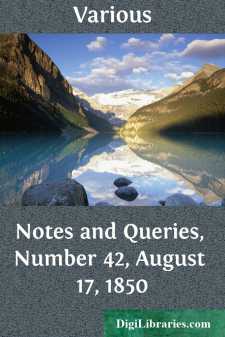Categories
- Antiques & Collectibles 13
- Architecture 36
- Art 48
- Bibles 22
- Biography & Autobiography 813
- Body, Mind & Spirit 142
- Business & Economics 28
- Children's Books 15
- Children's Fiction 12
- Computers 4
- Cooking 94
- Crafts & Hobbies 4
- Drama 346
- Education 46
- Family & Relationships 57
- Fiction 11828
- Games 19
- Gardening 17
- Health & Fitness 34
- History 1377
- House & Home 1
- Humor 147
- Juvenile Fiction 1873
- Juvenile Nonfiction 202
- Language Arts & Disciplines 88
- Law 16
- Literary Collections 686
- Literary Criticism 179
- Mathematics 13
- Medical 41
- Music 40
- Nature 179
- Non-Classifiable 1768
- Performing Arts 7
- Periodicals 1453
- Philosophy 64
- Photography 2
- Poetry 896
- Political Science 203
- Psychology 42
- Reference 154
- Religion 513
- Science 126
- Self-Help 84
- Social Science 81
- Sports & Recreation 34
- Study Aids 3
- Technology & Engineering 59
- Transportation 23
- Travel 463
- True Crime 29
Notes and Queries, Number 42, August 17, 1850
by: Various
Categories:
Description:
Excerpt
NOTES
ALFRED'S OROSIUS.
The two exceedingly valuable elucidations which the geography of King Alfred relating to Germany (intercalated in the royal author's translation of Orosius), has received from your learned contributors MR. R.T. HAMPSON (Vol. i., p. 257.) and MR. S.W. SINGER (Vol. i., p. 313.) induce me to offer some new views on the same subject. From my having passed a long series of years in the countries described, and read and examined all that continental authors, as well as Englishmen, have written or conjectured on the subject, I trust that my opinions, though differing from all hitherto received, may not be unworthy the attention of these gentlemen, and of your other numerous subscribers. I shall, however, at present, not to exceed the necessary limitation of your articles, restrict myself to a consideration of the very disputed Cwenas and the Cwen-sae, which both the gentlemen have not alluded to.
The universal agreement amongst the commentators (with the two solitary exceptions I shall hereafter mention), by which this sea is taken for the White Sea, is diverting, and has been the primary source of many of their errors, and of that most monster one, by which Othere's narrative has been made the relation of a voyage round the North Cape to Archangel. It is difficult to say who may have first broached the brilliant idea. Spelmann's annotators, his alumni Oxonienses of University College, seem to have left the matter without much consideration, in which they were pretty servilely followed by Bussæus, though not so much so as to justify Professor Ingram's remark, "that his notes were chiefly extracted thence." (Pref. viii.) Professor Murray of Göttingen (1765), and Langebeck, in his Scriptores Rerum Danicarum (1773), make no mention of these arctic discoveries; and the latter is satisfied that the Cwenas are the Amazons of Adam of Bremen:—
"De Quenorum priscis Sedibus et Quenlandiæ situ, vide Torfæus, Hist. Norweg. i. 140. Adamus Bremens, pp. 58, 59. 61., per Amazones et terram Foeminarum voluit Queuones et Quenladiam intelligi."
and it remains, therefore, to the next commentator, John Reinhold Forster (the companion navigator with Sir Joseph Banks), to have been the first to whom we owe the important error. He was praised by Daines Barrington, for whose edition he gave the notes afterwards reproduced in his Northern Voyages of Discovery; but still with certain reservations. The honourable translator found some negative evidences which seemed to militate against the idea that the voyage could have extended into the arctic circle; for, in such a case, Othere would hardly have refrained from mentioning the perpetual day of those regions; the northern lights, which he must have experienced; to which we add, the perpetual snows, and many other very striking peculiarities, so new and seemingly inexplicable to a southern traveller or listener.
Succeeding writers seem to have had fewer scruples, and to have admitted the idea without consideration....












